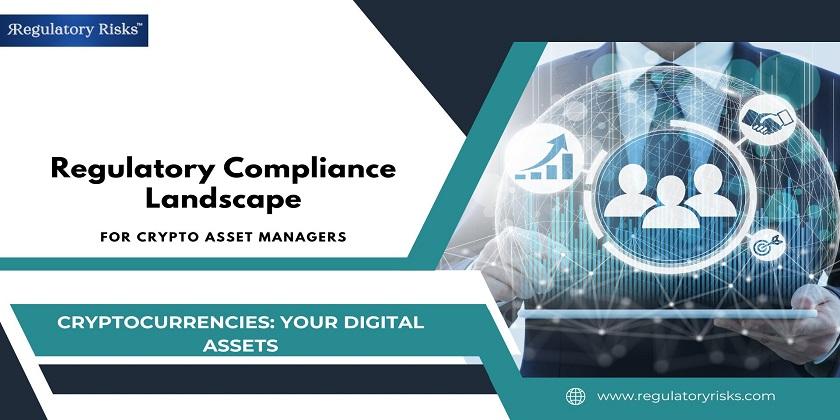The rise of Cryptocurrencies and Blockchain Technology has ushered in a new era in the financial industry, giving birth to a unique category of financial professionals: Crypto Asset Managers. These professionals are responsible for managing Digital Assets and navigating a regulatory landscape that is still evolving. In this article, we will explore the Regulatory Compliance Requirements imposed on Crypto Asset Managers, offering insights into the complex world of Digital Asset Management.
Regulatory Landscape
Cryptocurrencies and Digital Assets have gained traction as a new class of financial assets. While they offer exciting opportunities for investment, they also come with a unique set of regulatory challenges. The regulatory landscape for Crypto Asset Managers varies from one jurisdiction to another and is subject to ongoing development. The key regulatory areas that crypto asset managers need to navigate include:
1. Anti-Money Laundering (AML) and Know Your Customer (KYC) Regulations: Crypto Asset Managers are often required to implement robust AML and KYC Procedures to prevent Money Laundering and ensure the identification of clients. These regulations mandate the verification of the identity of individuals and entities involved in Crypto Transactions.
The November 2023 enforcement action taken by U.S. government agencies against Cryptocurrency firm Binance (US$4.5 billion fine) for Crypto Financial Crime Compliance violations is just one of many examples. The ever-evolving nature of Financial Crime Compliance demands Financial Crime Risk Management to safeguard assets and maintain compliance, including Crypto Financial Crime Compliance. Strengthen your defenses and post a Financial Crime Compliance Job on the Regulatory Risks™ platform and Hire a MLRO (Money Laundering Reporting Officer) or AML Consultant.
2. Securities Regulations: Some Digital Assets may be classified as securities, subjecting Crypto Asset Managers to Securities Laws and Regulations. This includes registration, licensing, and reporting requirements. The determination of whether a particular asset is a security can be complex and varies by jurisdiction.
3. Tax Compliance: Tax Compliance for Crypto Asset Managers can be intricate, with rules varying by jurisdiction. Some countries treat Cryptocurrencies as property subject to capital gains tax, while others classify them as currency or commodities, impacting tax liability.
4. Consumer Protection Regulations: Regulators may impose consumer protection measures to safeguard investors in the Crypto space. These can include rules related to disclosures, transparency, and dispute resolution.
5. Licensing and Registration: Embarking on building a business in a regulated industry, e.g. in financial services, including sub-industries such as Cryptocurrencies and Digital Assets, requires more than just expertise – it demands a thorough understanding of the Regulations for Licensing and Authorizations. These credentials not only validate your business but also ensure Compliance with Regulatory Frameworks, instilling trust in clients and safeguarding against Regulatory Risks and complications. Depending on the jurisdiction, Crypto Asset Managers may need to obtain specific licenses or registrations to operate legally.
6. Data Privacy and Security: Data Privacy Regulations, such as the European Union's General Data Protection Regulation (GDPR), can apply to Crypto Asset Managers. These regulations require the secure handling of personal data and reporting data breaches.
7. Market Manipulation and Fraud: Crypto Asset Managers need to be vigilant against Market Manipulation and Fraud in the Cryptocurrency space. Regulatory authorities aim to prevent and detect Fraudulent Activities and Market Abuse.
Challenges and Complexity
The compliance requirements for Crypto Asset Managers are intricate due to the evolving nature of the Crypto industry and the diversity of regulations worldwide. Key challenges include:
1. Global Reach: Crypto Asset Managers often operate on a global scale, making it essential to navigate different and sometimes conflicting regulations in various jurisdictions.
2. Lack of Standardization: The absence of standardized regulations for Cryptocurrencies and Digital Assets can create confusion and uncertainty.
3. Technological Innovation: Rapid technological advancements in the Crypto space require ongoing adaptation and innovation in compliance measures.
4. Rapid Regulatory Changes: Regulatory Frameworks for Cryptocurrencies are continuously evolving, making it crucial for Crypto Asset Managers to stay updated and adapt swiftly.
5. Client Identification: Ensuring the correct identification of clients and the source of funds can be challenging in the pseudonymous and decentralized world of Cryptocurrencies.
Conclusion
Crypto Asset Managers face a complex and dynamic Regulatory Environment that demands adaptability and vigilance. Navigating the compliance landscape for Cryptocurrencies is essential to operate legally, maintain the trust of clients, and safeguard the integrity of the Digital Asset industry. Staying informed about the evolving regulatory requirements and working with a Compliance Expert is crucial for Crypto Asset Managers to thrive in this emerging financial landscape.
Elevate your business, mitigate risks, and enlist the support of a Regulatory Risks™ Compliance Consultant to guide you on this transformative path to responsible and ethical business practices. Efficiency Redefined: The Regulatory Risks™ platform streamlines the hiring process, saving you time and effort.





